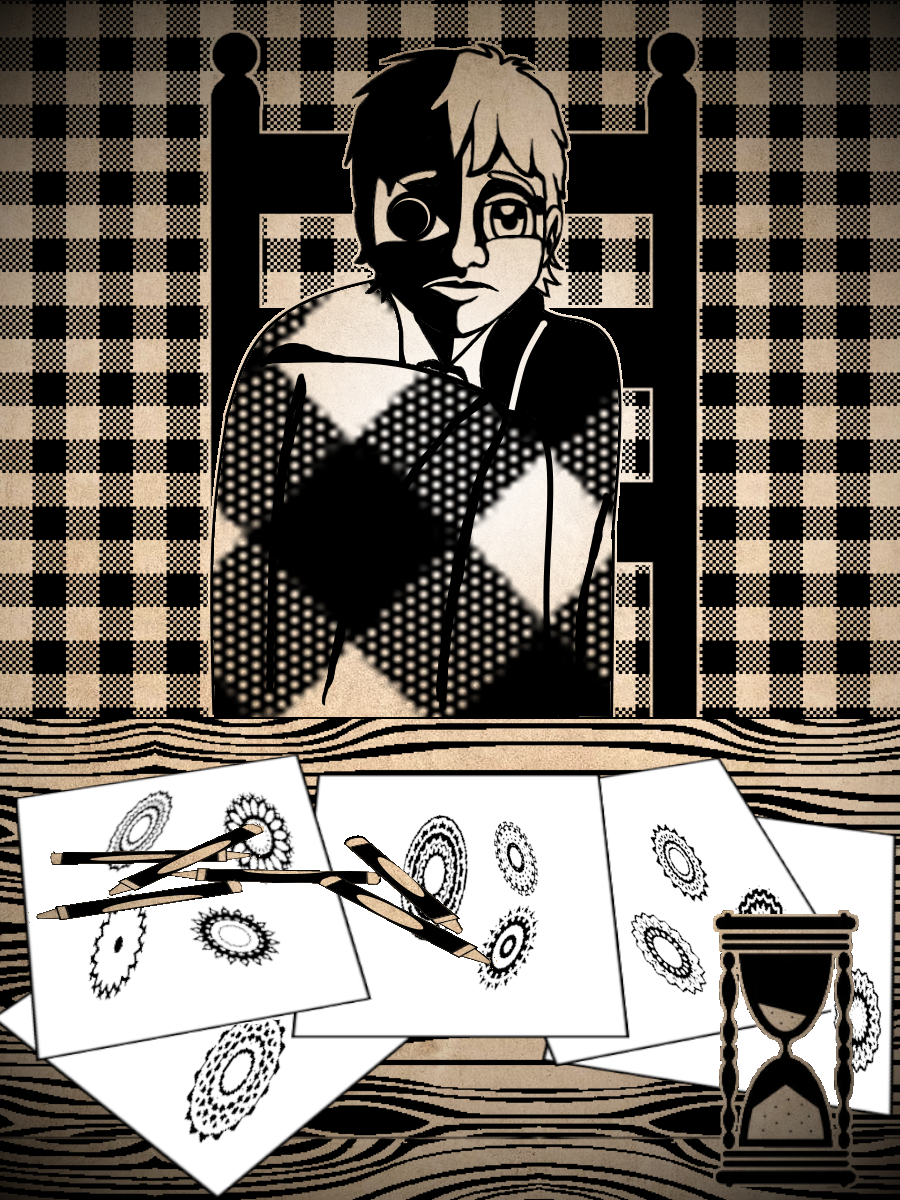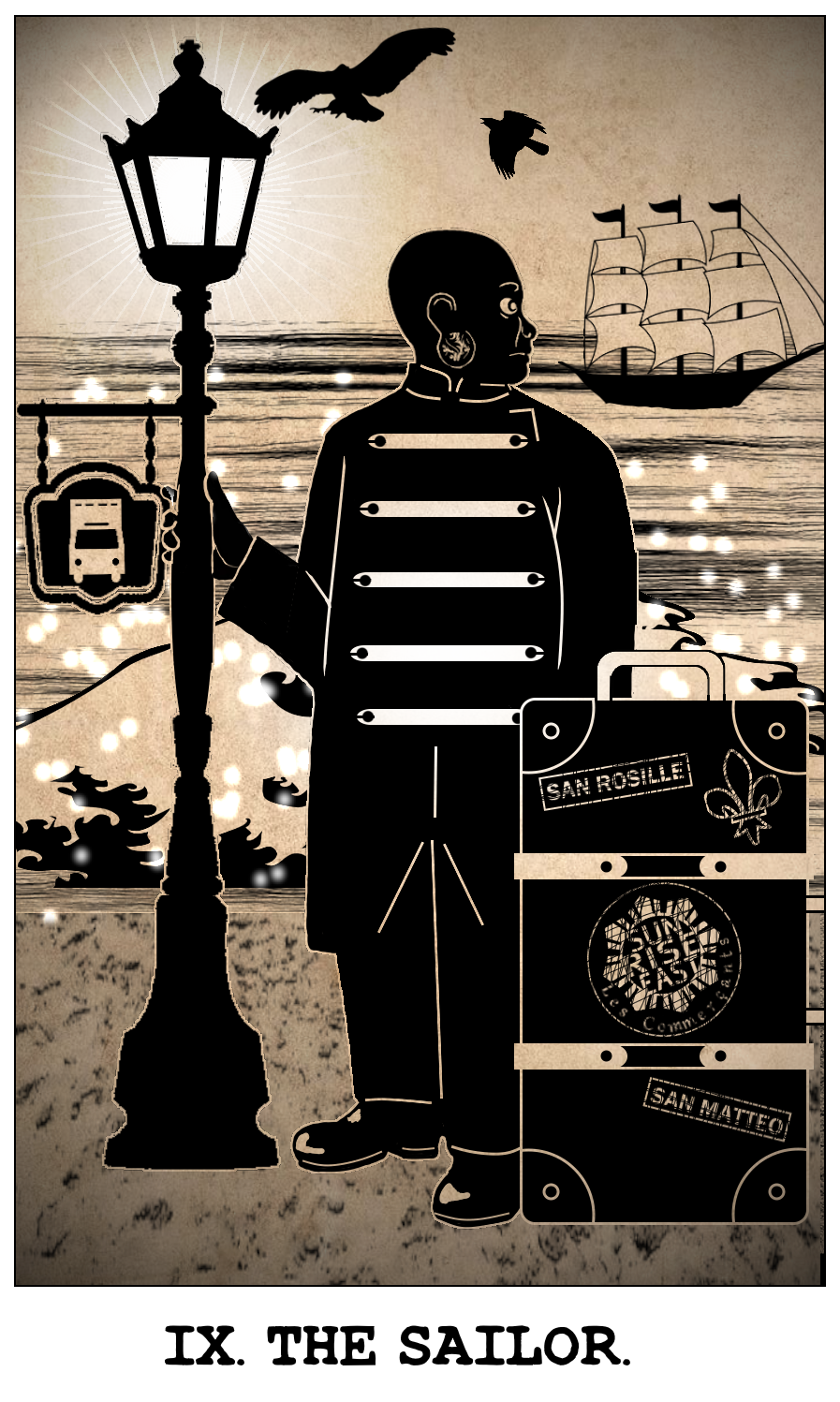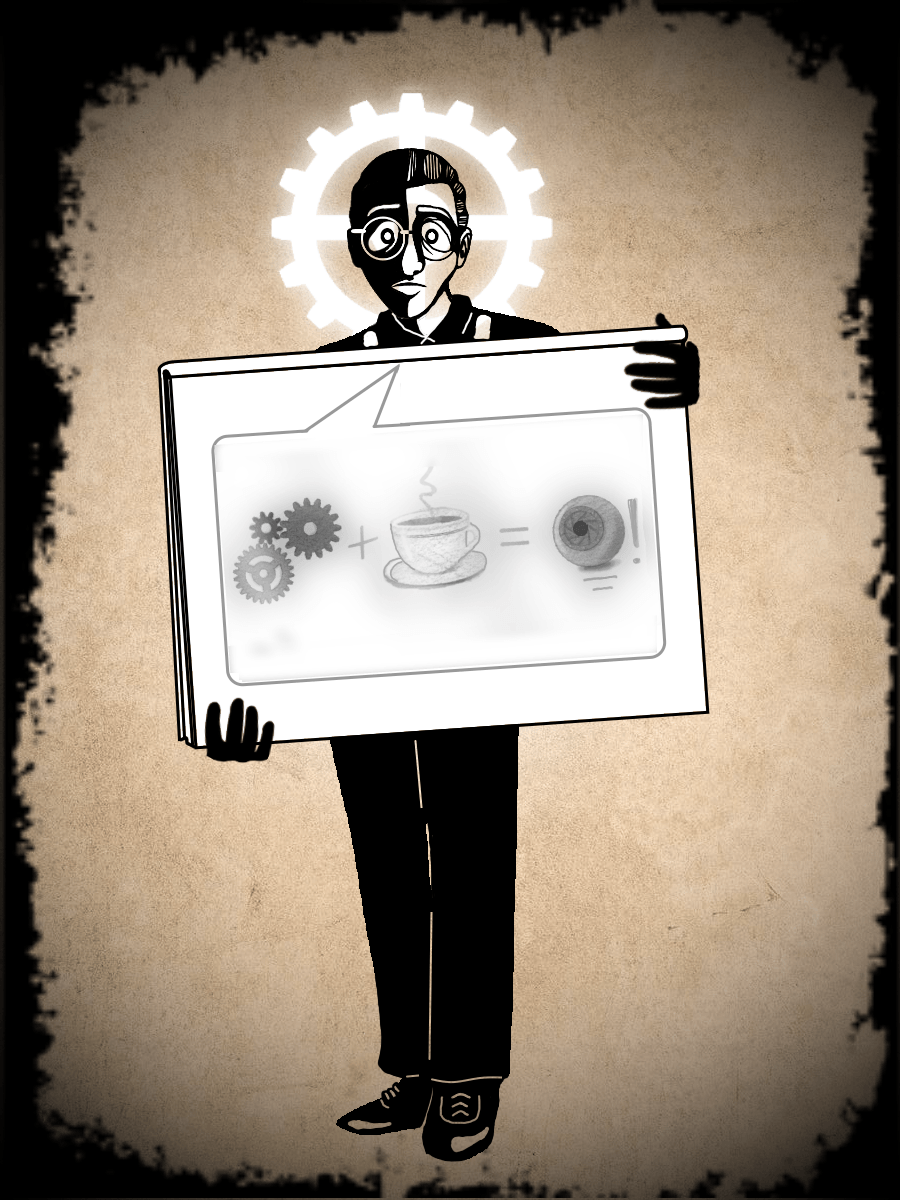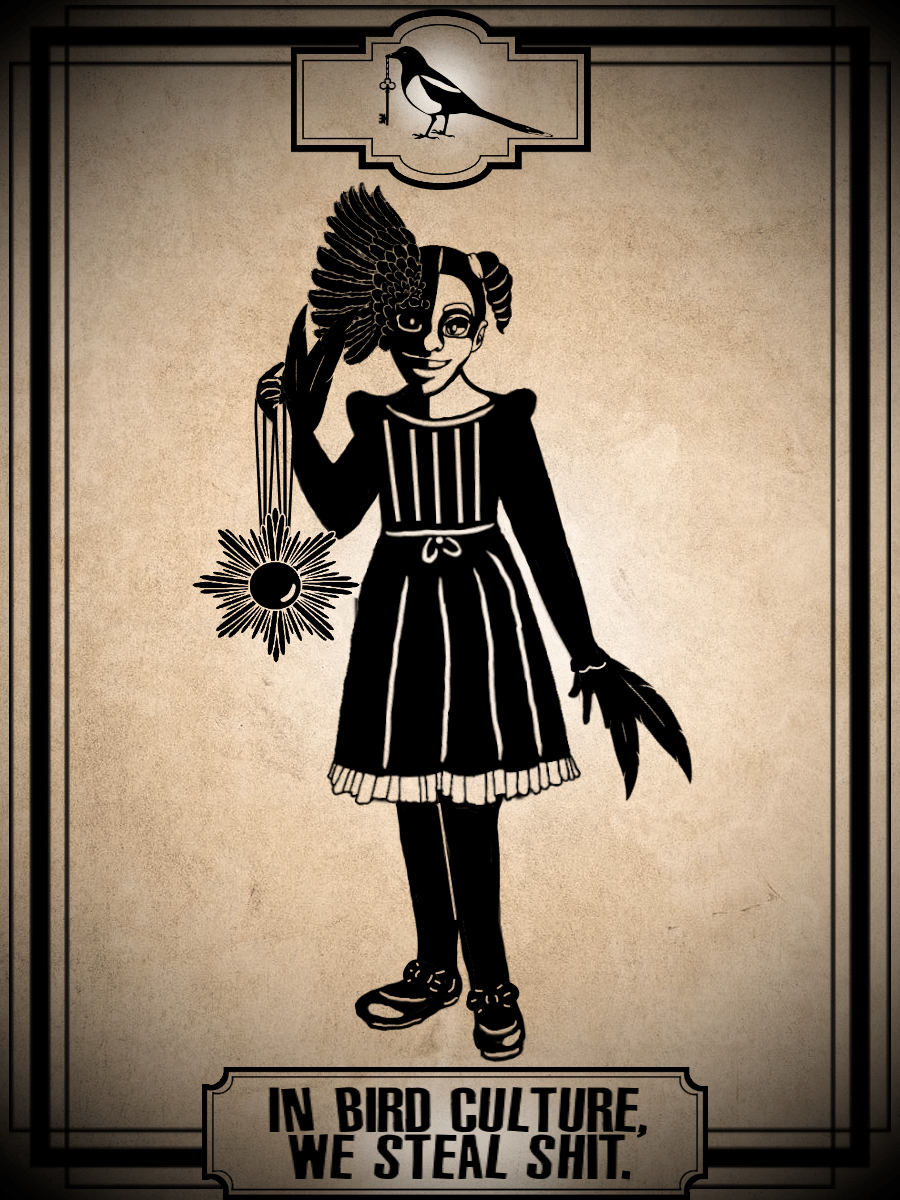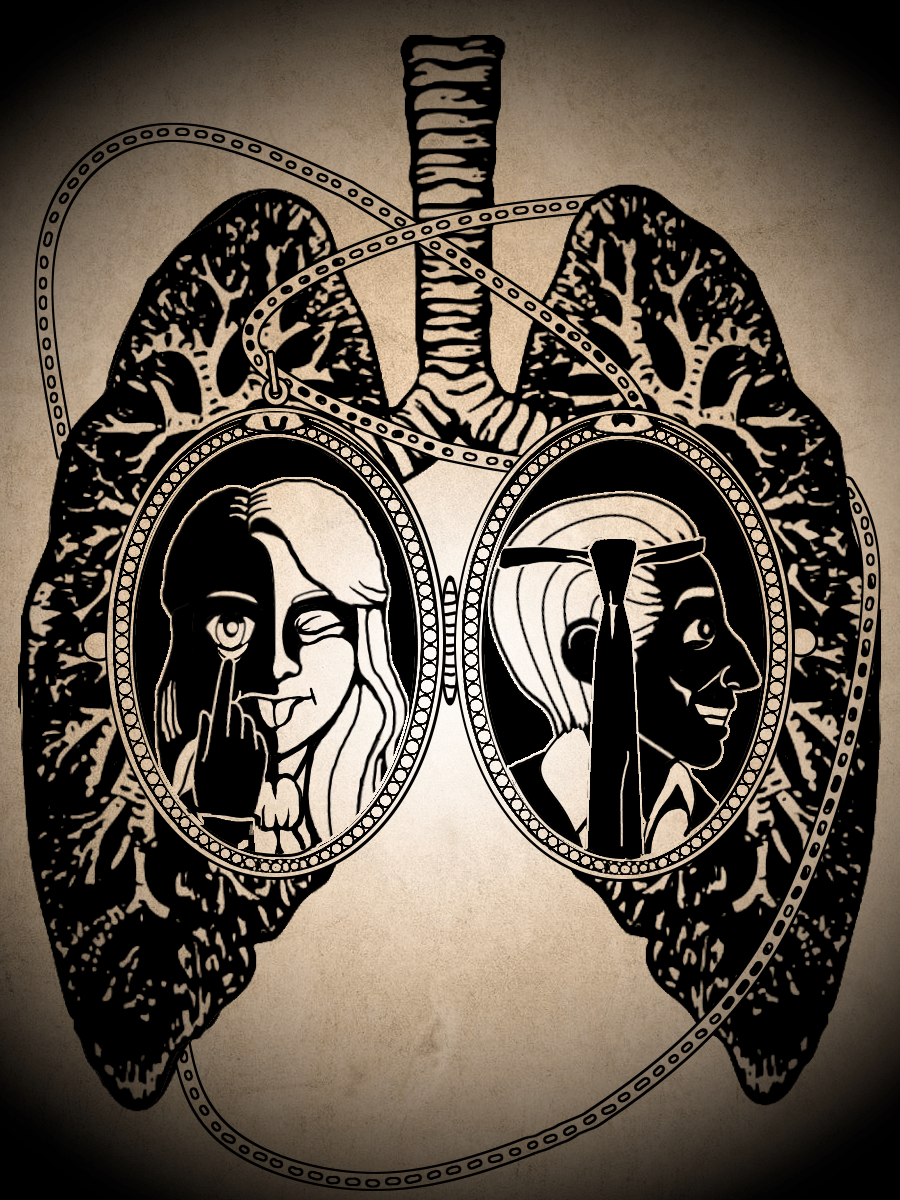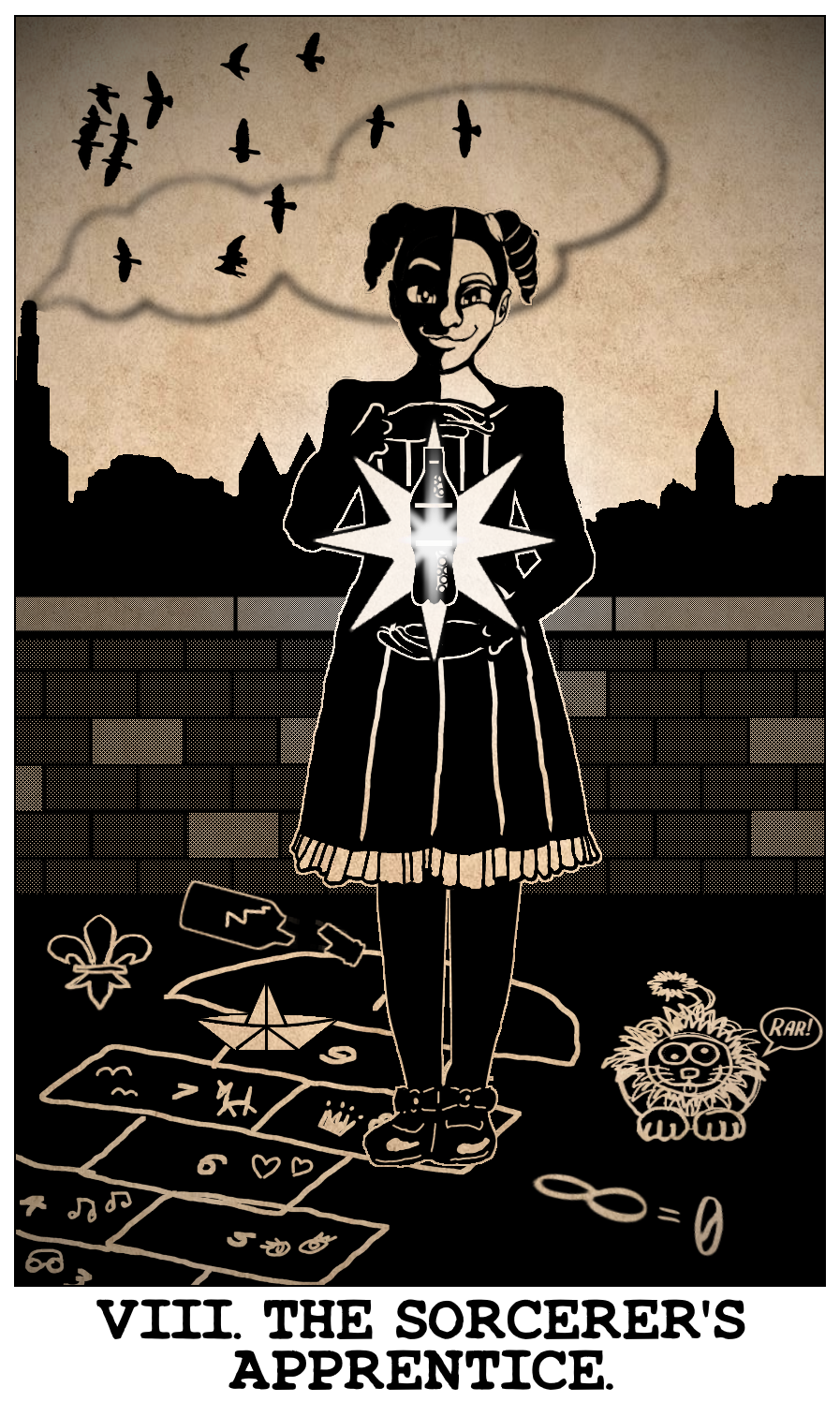Mordecai crept into the bedroom without being particularly careful about footsteps, the lights or the door. The rest of the house might be sleeping, but he doubted Erik would be, despite the lateness of the hour.
Erik did happen to be in the bed with his eye closed, but as soon as he pushed the door in the general direction of “shut” behind him, Mordecai sought to remedy that situation.
He jumped up and down. There were coins in the violin case and coins in every pocket and he jingled like sleigh bells.
“Erik!” he cried. “I have money!”
Erik sat up, not in the least bit groggy, and spread his arms for a hug. Hyacinth had gotten him into his nightshirt with his teeth brushed and that was about it. He even had his other eye in, he’d just smooshed it against the pillow so it wouldn’t look at the walls while he had the real one closed.
Mordecai wrapped arms around him. He had neglected to drop the violin case and he conked Erik lightly in the back of the head with it. “Oh. Oh, sorry,” he said, setting it aside. The loose coins rattled.
Please don’t shoot the violinist, he is doing his best, the topmost sticker advised. There were also some musical notes. The other side had a butterfly.
Maggie and Sanaam had sought to remedy Mordecai’s battered violin case with a gift of stickers for fake Yule. Erik and Maggie got to put them on, most of them. Mordecai refused to allow the one that said Violinists do it allegretto. So Maggie stuck that one to the bottom hem of his coat.
He hadn’t noticed it yet, and she used magic so he wouldn’t be able to take it off when he did.
Erik beamed at him. “How was Angie?”
“Wonderful!” He caught himself, snickered and shrugged. “Well, I mean, okay. She behaved herself. I‘d be embarrassed to have her in a concert hall, but they wouldn’t let me into one of those anyway, so that’s all right.”
“Nothing bad?” Erik asked, more seriously.
His uncle had been worried about something bad. His uncle had been worried about everything bad, that was why Erik wasn’t allowed to come along. The last time he had gone with his uncle, a lot of bad had happened.
That wouldn’t happen again, he wouldn’t ever do anything that stupid ever again, but Uncle Mordecai didn’t worry because he thought Erik was stupid. He was worried because he thought he had been stupid, and a million worse things. Things like “careless” and “weak” and “not enough.”
He was worried that when he tried to play to make money — just so that he could support them again, let alone start paying anything back — that he wouldn’t get any music at all, just screeching like when Erik tried to play or even silence, because he was “not enough.”
Mordecai shook his head, smiling. “No, nothing bad.”
He had been terrified, the whole time. The worst was on the bus, and then setting up. He had dropped the violin twice, and the second time he was sure he had broken something, but Angie was a tough old girl, he’d give her that.
Now, through with it and home in one piece with his pockets full of change, he was giddy. “Your uncle is just a big, dumb coward, that’s all,” he said.
Erik frowned at him. “You were brave,” he said.
Mordecai laughed. “Maybe, but it didn’t feel like it!” He hugged Erik again. “Dear one, what should we do tomorrow? Ice cream? Movies? Arcade games? I’ll buy us the moon if you want! What do you think?”
“Not the moon,” said Erik. That would be really expensive. They’d have to eat it or live on it or wear it or something. That wouldn’t be any fun.
“Can we wait until Sun’s Day?” he asked. “Then Maggie can come.”
Mordecai drew back. He sobered somewhat. “Erik, if you want to do something with Maggie we can do that, too, in a little. But this, right now, this is for us. This is before I even give Hyacinth any rent. This is so we can have something fun, after everything that happened. This is important.”
Erik thought Maggie was pretty important, but he knew his uncle thought rent for Hyacinth was important too. This thing where they went out and had fun and Uncle Mordecai could pay for it was different important.
“Let’s have the movies,” Erik said. “It’s two on Sigurd’s Day, and music reels and stuff too.”
Mordecai took him by both shoulders and tried to be stern, “Now, Erik, you didn’t just pick movies because they’re cheap?”
“I like the movies,” Erik said. “You… like the… movies! Your… job was the… movies!” He wasn’t sure if he was offended or hurt.
He was unnerved too. The cheapness had factored in a little, but he really did want to go. They hadn’t been to the movies in forever.
Mordecai grinned at him. “I’m going to clear out the concession stand if we go to the movies, you know. We’ll have three different kinds of candy. And some of those awful hot dogs they’ve been rolling back and forth on the auto-grill for a week.”
“Popcorn?” Erik said.
“There cannot be a movie without popcorn,” Mordecai declared. “It’s a kind of magic. If the whole audience isn’t eating popcorn, the projector won’t go. I’ve seen it happen.”
“What about during the siege?” Erik said.
Mordecai laid a hand across his chest. “I am capable of doing substitutions that fool movie projectors as well as gods.”
“What do you sub for popcorn?”
“Grasshoppers, but just the heads. They’re crunchy.”
“Ew!” Erik said and giggled.
He knew it was teasing, but he believed it at the same time. Every word. He was seven years old and he felt he deserved a world where movie projectors could tell if the audience was eating popcorn but grasshopper heads would do in a pinch. Also, alligators in the sewers and kids who kept making that face until it froze that way.
“The screen attracts bugs, you know,” Mordecai went on. “It’s the light. You just have to…”
Ann had come home a few moments ago from her evening spent making money to find the lights in the front room showing through the window and the door to Room 102 open a crack. She tapped on it. “Em? Did you just get in?”
“Yes!” He jumped up and down for her too.
“Oh, that’s marvellous! How was it?”
“Wonderful! Nobody threw anything… Well, I mean, coins — but not at my head! And the police even left me alone! I’m going to pay Milo back for Yule as soon as I get on top of my rent with Hyacinth, all right?”
“Mm,” Ann said. “I wouldn’t worry about it too much, dear. Milo can wait.” She smiled and touched a hand over her mouth. “Em, are you aware you have a sticker at the bottom hem of your coat? Just there…”
He turned a rapid circle, trying to see it, and the coat spun around him like a skirt. “Damn it, it’s the one about doing it allegretto, isn’t it? Erik!”
Erik grinned, shamefaced.
“I’ll just get it then, shall I?” Ann said. “Oh, dear. I suppose I’d better ask Milo…”
◈◈◈
The movie theatre meant getting on the bus, and that meant walking — to the bus stop on Violena, and from the bus stop on South Hollister. So of course they were going to run into some animals that required caution.
Given the improvement to the neighbourhood and income in SoHo (it was the art district, with a lot of young kids trying to live cheaply, but that was still miles above Strawberryfield) they were going to run into some horses.
There had been some horses previously, but if you paid attention and looked up and down the street, usually the only precaution needed was to wait a bit. Maybe to duck into an alley or cross the street at most. You didn’t have to be near the damn things.
But, out in front of La Stella, just across the street, there was a cart with a man attempting to sell flowers — a horse-drawn cart. That would either require walking past or some convoluted application of tactics.
Mordecai snatched Erik by the shoulder and pulled him behind a cement planter box. They both peeped past nervously.
“Damn it, that guy can’t have a permit to be there,” Mordecai said. “I ought to call the cops!”
Nevermind that he had been out making money without a permit just last night. He hadn’t been in the way of law-abiding… of reasonably law-abiding people trying to access a movie theatre!
Erik could already envision a way past. Being out and about with Soup had sharpened up his dodging abilities. Planter boxes every ten feet all the way up to the theatre. Lampposts. Trash cans. Guy with a card table trying to sell paintings. And we can duck into one of the shops if anything goes wrong. Safe as houses.
But that didn’t mean he wanted to. He sort of wanted to cry.
Mordecai felt the same. It wasn’t going to happen again, he knew that. There were going to be horses. There was going to be walking around and being normal and having a life and there were going to be horses.
But it had been so hard and so much just getting here and he didn’t want there to be horses. This was the part where it got better. It was supposed to be easy. There was supposed to be a movie and popcorn and three different kinds of candy and just being happy, not hiding behind a planter box and remembering everything else and being sick and afraid. This wasn’t fair.
He wanted to say they didn’t have to do this now, that it didn’t matter. They could come back tomorrow. They could just go home. But he thought if he said that, if either of them said that, they would just go home. And they might not come back tomorrow. Or, if they did come, it wouldn’t be the same.
They crouched behind the planter box, holding each other, and waited awhile to see if either of them was going to say that.
Erik wrapped his fingers around his watch chain. It helped some. The watch was safe. He took a deep breath and forced the words out as fast as he could get them. It was almost like normal. “I want a movie,” he said.
“Okay,” said Mordecai. He took hold of Erik’s hand. “We’re going to have a movie.”
He put himself between Erik and the horse and he put the planter boxes between himself and the horse and they held hands like they were trying to crush each other’s fingers and they walked up to the theatre.
Erik had his other hand in his pocket clasping the watch. Mordecai kept saying “It’s okay,” and Erik kept saying, “I know,” but in a tearful little voice that didn’t know. Mordecai was not achieving great confidence in voice or action either. He didn’t look at the horse. He didn’t feel quite safe looking at the horse.
Erik couldn’t stop looking at the horse.
Mordecai stood rigidly straight, feeling as if his spine were made of solid ice and said, “Two, please,” to the lady in the ticket office.
“Twenty scints,” said the lady in the ticket office. She had horn-rimmed glasses and a mole on her left cheek and that was all Mordecai managed to absorb about her.
The horse had blinders and a feedbag and it was brown and it was big, that was what Erik was noticing, but not really thinking about. Except the “it’s big” part. But the way he was feeling, a pony would’ve looked about twelve feet tall.
It took Mordecai several awkward moments before he realized he needed to give the lady in the ticket booth twenty scints. It seemed like he only had pennies. He counted them out with shaking fingers and the lady dispensed two pink “Admit One” tickets in the little metal tray, already torn in two.
Then they were inside and there was, thank gods, a bench and a potted plant and a drinking fountain and enough space to collect themselves.
Nobody cried. They said “okay” a lot and drank water. After a few minutes, Erik laughed, and he put both hands over his face, ashamed. Mordecai did likewise. “Okay,” he said. “Yeah. Okay.”
“This… better be the… best movie!” Erik said.
“I don’t know what movie it is,” Mordecai replied. There had been big black letters on the marquee, but neither of them could recall what any of them were.
So they both laughed about that.
It was not possible to clear out the concession stand, not at movie theatre prices. Theatres made most of their money on concessions, Mordecai knew. The movies were just there to get you to sit down and consume terrible food at exorbitant prices.
Mordecai insisted on the popcorn and the hot dogs and the three different kinds of candy, but it looked like they weren’t going to be able to manage much else and still get a bus home.
“What about sodas?” Erik asked. They were in a cooler with a glass front, all different colours, like Yule lights.
“Ye…” said Mordecai, but he paused and dropped his hand. “Wait. I think Barnaby said not to. It was something about not having a soda, anyway.”
“Barnaby?” said Erik.
Erik and Mordecai conferred suspiciously in front of the cooler with the sodas, much to the confusion of the cashier.
Flat, Mordecai thought.
Poisoned, Erik thought.
There was nothing further about sodas until the cashier pulled one out of the cooler without being asked and put it with the rest of the food. “For the kid,” he said. “No, no charge.”
Mordecai regarded the bottle. “Oh,” he said. “Free,” he noted to Erik. Although, that did not necessarily preclude flat. Flat would tend to explain it, if that did turn out to be the case.
It was a purple one. Grape.
Erik took the bottle. He touched two curious fingers to his metal eye.
He had picked up a couple free sodas from the bodega near the house, and that cart where Maggie liked to get lunches. He guessed those people knew him and knew he got hurt and felt bad about it.
He was a little scrambled about how things had been before he got hurt, but he didn’t think the people at La Stella knew him. They went there a lot, but La Stella was big, with a lot of people working there and a lot of kids coming in, even green kids.
I mean, I guess people can tell I got hurt, he thought. I look patched. It doesn’t look like I was born this way.
But then how do they know I like grape?
It’s like how the movie projector knows you’re eating popcorn, he decided with a snicker.
La Stella was one of the old movie theatres — “old,” in this case, meaning “from before the siege,” so at least older than Erik. Most of the old theatres had been blown up, or disassembled. La Stella had survived a little of this, but the building itself remained solid enough to go back into business with a few repairs, some retrofitting for sound film, and, just lately, colour.
Mordecai was not too impressed with sound, or with colour film either. There used to be colour, it was weird how fast people forgot. Yellow Submarine had been tinted by hand. And animated! And feature length! Why did Snow White get all the attention?
The antiquated design rendered the lobby permanently palatial. The gold mirrors and the plush red carpet had gone — replaced with swirly metallic wallpaper and linoleum, respectively — but the gold-painted fixtures and vast spaces remained. There was even a bar, though this was no longer in use and the brass taps, if turned, would yield only a whisper of dusty air.
The stub of stage under the screen for the musicians and the private boxes on the theatre walls were similar relics of a heady past where fifteen minutes of grainy black-and-white people riding a trolley was kind of a big deal.
There were two sweeping staircases leading up to the balcony, for no reason save symmetry. Erik and Mordecai took the one on the right, without much fanfare.
This sort of arrangement was known as “segregated seating.” Or, with forced amusement, “the candy dish.” They used to do it on buses as well, but when the new designs with the top deck had come out, a gestalt opinion of which seats were the worst had failed to develop.
It wasn’t like there was a law, the practice was merely enforced by people pulling you aside and informing you that you were in the wrong place, with varying levels of tact and discretion. All the way from “Excuse me, I don’t know if you’re aware,” to “Hey, what the hell are you doing?”
“For safety” was the reason given, if there was a reason given at all. If, for example, a magic storm should suddenly coalesce out of nowhere, then all of the weird people would be in one place — so that the nice, normal people could get away from them.
“It’s so if there’s a fire, we’re the last ones who get out,” was what Mordecai’s father had told him. But Mordecai’s father had a sarcastic streak a mile wide, and he wasn’t going to bullshit a four-year-old.
“It’s because we’re special,” was what Mordecai had told Erik, but that probably wasn’t going to hold up for much longer. At least, not the idea that “special” meant “better” rather than “different and bad.”
Due to this sentiment, anyone who showed up in a theatre looking particularly odd or foreign tended to get directed to the candy dish as well. They met some interesting people that way. Occasionally crazy people, yes, but sometimes interesting in a more positive sense.
For instance, a man with a full beard and a turban and a sheathed sword and an eyepatch had once sat down next to them midway through the cartoon. Erik had decided this person was a pirate. Mordecai knew this because a tiny voice that didn’t fully understand about speaking softly in movie theatres yet (at least, not if something cool happened) had piped up an instant later and inquired, “Excuse me, are you a real pirate or is it just for pretend?”
The man had been very understanding. Maybe he was used to it, or maybe it was a religious thing, like the sword. The sword, he had explained, was never meant to be drawn. Something about nonviolence. So, no, he had never killed anyone. No, he was not a pirate. No, he did not know Maggie’s daddy. Or have a parrot. No, definitely not a pirate, sorry.
Erik had wanted a look under the eyepatch, but Mordecai had managed to get a hand over his mouth and explain that it was time to stop asking questions right now and oh, look, a music reel, let’s sing along.
But, apart from the mortification, it had been a good experience and both Erik and Mordecai got their horizons broadened a little. Things like that tended to make up for being the last people to get out if there was a fire. There was a communal aspect with segregated seating. We’re all friends. We’re all alike. I mean, we must be, right?
Erik, Mordecai, and most of the others had never seen so many people who looked like them grouped together in any other context — certainly never on the screen all of them were watching.
A Sigurd’s Day matinée with two feature-length films meant a packed theatre, candy dish included, and a lot of kids who didn’t understand about speaking softly in movie theatres even if something cool happened. Or if it got too boring.
Erik and Mordecai arrived at the very end of the newsreel, so there was some complaining about the boredom and throwing of empty boxes and dead popcorn kernels going on.
The floor was mysteriously sticky, as always, and the seats were upholstered in a stained, red fuzzy substance — with useless little metal numbers on the front, since assigned seating had gone the way of Music Vox, alcohol in the lobby, and Mordecai’s career.
An obligatory voice said, “Down in front!” while they looked for two empty seats together. Gods, it wasn’t like they got there in the middle of the picture. It was just the news. It wasn’t even in colour.
There were three seats at the middle front, right up against the balcony rail. An acrophobe’s delight. Likewise, a mischievous kid with a peashooter would’ve had a ball. Some teenagers were resting their feet on the rail and had to be politely encouraged to make room, while Erik and Mordecai juggled popcorn and candy and walked sideways.
As they settled in, Mordecai took absent note of current events. It looked like the Emperor — no, no, sorry, the PM — was paying another call on the Czarevna up north. She never seemed to come down and visit him, though the weather had to be nicer.
Marsellia was provincial, maybe. Anyone who was anyone vacationed in Iliodario, farther south, with warm seas and painted dancers.
The happy couple were engaged in a croquet game — indoors, due to the snow. Snow in April, for gods’ sakes. It was absurd. The newscaster jovially referred to Marsellia’s fearless leader as “Bertie.”
“Making a fool of himself,” Mordecai muttered, a hand to his head. “He’s got to be half her age.” That, and she looked big enough to eat him. She might as well. Her father had already made a meal of the country.
“Am I half Maggie’s age?” Erik asked, much quieter than the pirate question in years previous. Erik had manners. And a sense of shame.
Unlike certain politicians.
“No,” said Mordecai. “You used to be. When you were two-and-a-half, you were half Maggie’s age.”
“I caught up to her,” Erik said proudly.
“Mm-hm.”
“Will Mr. Adelbert catch up to the big lady?”
“Gods, I hope not,” Mordecai said. That was a marriage made in hell. Nevermind how ridiculous it would be, aesthetically, it would mean the end of any kind of Marselline independence. Although it seemed like the Emp… the Prime Minister… Bertie might be angling for that sort of thing.
Diane would’ve made a better PM, “Bertie,” thought Mordecai. Even a fake one. Of course, Diane wouldn’t have surrendered in the first place. That was sort of the point.
Diane Desdoux wouldn’t be scampering around up there on the silver screen, larger than life, playing courtier to the hideous spectre of colonial subjugation in human form.
I can’t imagine that creature has ankles, thought Mordecai, assuring himself he was all done with Diane and politics and this was a matter of dispassionate observation. The woman was ugly. Anyone could see it. Her legs had to be like a pair of rolled roasts to support that body. It was basic architecture. An object like that required buttressing.
Strolling the grounds of her father’s winter palace in a fur coat and a fluffy hat the size of an ottoman, she bore every resemblance to a bear. “Bertie,” travelling in her wake, was like one of those nervous little birds that makes its living cleaning crocodiles’ teeth.
The women in the closing segment definitely had ankles, though. This was, after an abrupt segue, on a Miramar beach. Where there was no snow, ever, and apparently no moral compunction. To the point where, the newscaster informed them, there was now a new profession available: “Bathing suit inspector.” It involved a lot of frowning (Gods, how could you frown at that? Mordecai wondered) and a measuring tape.
The latest in bathing suit technology offered a short skirt that hit at mid-thigh, a pair of bloomers beneath, no sleeves and no stockings. You know, to make the swimming a little easier. Obviously.
The whole audience erupted in ecstatic approval that bordered on religious. My gods, yes! I have seen the light! Women should be in no way restricted in their swimming ability by the outmoded constraints of fashion! Sharks might get them! It’s a safety issue!
The women being inspected (Women, not men. No one cared about men’s bathing suits, which Mordecai recalled having remained approximately the same since his own childhood, with occasional fads for different patterns. Stripes were in just now.) were smiling proudly and sometimes waving to the cameras, in stark contrast to the serious inspectors.
Even the poor little waif who was sent home wrapped in a municipal blanket because her bloomers failed to drop a full three inches below the knee seemed pleased with herself. She winked and blew a kiss.
“Do you think Ann would like one of those?” Erik asked, somewhat confused by all the hooting and hollering. They were sort of pretty, but the newscaster was just talking about how they were practical, which Erik supposed was true. Maybe people were excited because they were new?
“Not enough ruffles,” Mordecai replied. Or enough anything, really.
“Do you think Maggie…”
“Shh, Erik, the movie.” And, thank gods. Shh, Erik, the cartoon wouldn’t have worked. Nobody “shh”ed for the cartoon, or the serial. Especially if there was shooting involved, and there usually was. For the music reels, there were sometimes lyrics and a bouncing ball that encouraged the audience to sing.
The movie was in black and white, too, but most of them still were. The Wizard of Oz.
Mordecai twitched a smile of recognition and cast a glance at Erik.
The Oz books had been over a year ago, maybe two. Before Erik got hurt, in any case, so Mordecai couldn’t be sure how much the boy remembered. They might be worth a revisit, he didn’t think they had gotten through all of them in the first place. He wasn’t sure if the Oz books were in the coloured section of the library or not.
The library was also segregated, but it didn’t have a cute name like “the candy dish,” it was just annoying.
He might have to ask Milo. Ann did the shopping, but Milo was the one with his name on the library card, so he had to check out books on his own. It didn’t require talking, fortunately.
He wondered if any of these people, even the ones in the movie, knew there had been at least one other adaptation of The Wizard of Oz. That one had been a musical, by necessity. He remembered playing it, but not any of the songs. There had been so many movies. You had to learn them and forget them, or there would be no room in your head for anything but music, and most of it not very good. Most of it just for the dialogue.
He only remembered the really great ones. Yellow Submarine. Magical Mystery Tour. Tommy. The Wall. He went out and bought the cylinders for those, and later the records. He cranked up the volume when he heard the songs on the radio.
That earlier Wizard had nothing to recommend it, apart from an early attempt at special effects.
When the little girl on the big silver screen opened her mouth and began to sing, he knew the music from this version was going to make it to the radio too.
But he wouldn’t buy the record. He hadn’t bought a record in years, it was impossible to keep a record player in Hyacinth’s house, but even if he could. The music was nice, but it was slow.
Erik appeared perfectly enchanted with it.
When Dorothy woke up in Oz and the movie went colourful, literally over the rainbow, that won over the rest of the audience, even Mordecai. It got almost as big a reaction as the bathing suits, if only momentarily.
Following another song, which Mordecai definitely did not want on a record (or in his head, but he was certain it would be lodged there for the rest of the day) the Wicked Witch of the West put in an appearance and the red man had to put both hands over his face and stifle a groan.
Erik smiled and nudged him, “The lady is green!” Like me, he did not have to add.
“Mm-hm,” said Mordecai. It had been a while, but he was pretty sure the lady in the book was not green. Someone at the movie studio had decided to take advantage of the colour film, like switching the silver shoes to red.
I see it didn’t occur to them to colourize the good witch, thought Mordecai.
He really hoped Erik didn’t remember how the green lady was going to end up.
It was possible, there was just the faintest sliver of possibility, that they had changed the ending of the story somehow. Movies were always messing about with books. Dorothy was a blonde in the book. The shoes were silver. The Wicked Witch of the West might not get melted into a puddle. He held out hope.
He was therefore able to share in Erik’s dismay when the Wicked Witch of the West got melted into a puddle right on schedule.
“Maybe she’s faking,” Erik said weakly.
“Yeah,” a small voice behind them concurred. There was a ripple of nervous laughter in the candy dish.
She was not faking, everyone was very, very happy she was dead, and Dorothy got to go home and… there was some kind of ending there. It went back to black and white for the ending.
On the ground floor of the theatre there was applause. In the balcony… there was not no applause, but it was somewhat self-conscious and there was some muttering.
“She wanted to set that guy on fire…” one of the nearby teenagers said.
“Well, she didn’t have to be unredeemably evil and green, did she?” Mordecai snapped.
There was more muttered discussion and some agreement. Some of the people behind them were leaving. From the sound of it, others had gone right after the whole puddle thing.
A little voice, maybe the same one who had also hoped the witch might be faking, asked, “Do they think we really melt?”
A slightly lower voice, maybe an older sibling, replied, “I don’t know…”
Mordecai put hands over his eyes and tipped back his head. Oh, gods, now they were going to have people throwing buckets of water at them…
Well, that was better than rocks.
He laughed weakly, but it didn’t sound much like laughing.
“Do you want to go?” Erik asked him.
“Do you?”
Erik shook his head. He wrapped both his arms around his uncle’s arm and drew up his legs. “I want a movie.” There was still another movie. They didn’t have to count that one.
They stayed. The B picture involved a vampire. It was entirely in black and white, so no one at the studio had the bright idea to make the vampire purple or anything.
There were a couple murders, but Erik thought it was pretty okay. The vampire could turn into a bat, like the General could turn into a bird. And Maggie, now, too. Erik thought that was kind of funny.
He wondered if Maggie might like to see the vampire movie later, but not the other one. If they timed it right, they didn’t have to see the other one. Or they could go into the lobby and play on the stairs, maybe.
After the vampire, there were a couple of music reels and a serial about cowboys, which Erik and Mordecai consumed with determination.
When the newsreel came back on, they didn’t bother waiting until the part with the PM and the Czarevna. There was a newspaper at home. Erik read the comics and Mordecai read the front page and the editorials and that was all the news they felt they required.
Two movies plus extras and a break to have hysterics about a horse ate up most of the afternoon. The sun was beginning to go down when they emerged from the theatre — but it was not yet dark enough to be worried about vampires, so that was nice. The man with the horse and cart had also departed.
The lights of the marquee came on behind them, bathing the pavement in blinking red and yellow. THE WIZARD OF OZ/CURSE OF THE VAMPIRE/CULTURE CLASH.
The munchkins in Mordecai’s head were gleefully singing, follow the yellow brick road, follow the yellow brick road, despite Culture Clash’s valiant effort to overwrite it with “Karma Chameleon.” …Which was not great, but would have been preferable.
The goddamn Yellow Brick Road. He should’ve known better than to have anything to do with a yellow brick road. Why in the hell did he ever read Erik the Oz books in the first place? Oh, that was a long time ago, he’d told himself. I’m over it. It wasn’t anything to do with the books. It’s just a name.
It wasn’t a name, it was a goddamn omen.
Alba had died on the Yellow Brick Road and now this, now this…
Okay, this was nowhere near as bad. At all. And there had been a vampire movie, that was okay. But this was really stupid and it pissed him off.
Stupid munchkins. They made the munchkins tiny. Tiny munchkins, ruby slippers and a green witch. The movie people in Miramar are all on drugs, that’s what it is. Just… mountains of cocaine. And amphetamines. Pills. Explains the bathing suits too.
Erik’s first movie-related question was as regards the vampire learning to turn into a bat, and whether he would’ve had to kill a lot of mice to get it right. Then, drawing out his pocket watch, he wanted to know about when the next bus would get there and if they had time to look in more shop windows (that one over there had crystals).
Mordecai was briefly hopeful that the green witch hadn’t made too much of an impression, but of course that wasn’t the case. Erik was just trying like hell not to be bothered about it. He wanted today to be fun.
At long last, irritated with himself, he spat out, “Normal… people… do… magic… too!”
Mordecai wanted to tell his child that they were normal people, that coloured people were just the same as anybody else. They had jobs and houses and families. They were normal people.
But that would have been a lie, and not even a kind one. A foolish, unsafe one.
They weren’t normal people. They weren’t allowed to be normal people, and not just by a bigoted, judgmental population. Dogs and cows and horses didn’t have any care for skin colours and social norms, they didn’t like coloured people because there was something wrong with coloured people. The gods had messed them around like the movie people had altered The Wizard of Oz.
There was the superficial stuff, the stuff that was just weird, like the man with the turban and the sword. Colour, obviously. They were bright hues of the rainbow and milk white and pitch black rather than muted shades of pink and brown. The men didn’t have to worry about shaving in the morning and the women didn’t have to worry about certain other indignities. They tended to have good eyes and good teeth, he’d never seen a coloured person in glasses, because what god wanted to come down to earth and be hampered by a blind, toothless steed?
They might have had to put up with some discrimination if it were only that sort of thing, but they didn’t just have qualities, they had abilities. Calling down gods and other magics that “normal people” couldn’t do. Magic-users of all stripes were regarded with suspicion, but coloured people were more, and they were obvious.
And if ever one felt inclined to forget that, a magic storm would blow through a few times a year and provide ample reminders that coloured people were not just different, they were powerful.
And they were dangerous.
Of course the bad witch was green and the good witch was not. The bad witch was the one you were supposed to be afraid of. Because of what Erik was and what he could do, he needed to learn that fear like everyone else. He could destroy himself and everything he loved if he wasn’t careful.
Fear was the only way to keep him safe.
“It was stupid and unfair,” Mordecai said. “And I think they just made her green because she was the bad one… and because it was colour film and they could. People are stupid and unfair a lot. We won’t go back and see that movie again and maybe if enough people don’t, they won’t make movies like that anymore.” He sighed. “It might take a long time, though. You’ll have to be patient about it.”
“I… think we could… make them,” Erik muttered, frowning. There had been a whole balcony full of coloured people at the theatre. They could all do magic.
Mordecai sighed again. Yeah, Erik was getting a pretty good idea of what he was and what he could do. That was coming along fast.
“You might be able to,” Mordecai said. “You could call a few gods and take over a country, and make everyone afraid so they had to do what you said and they couldn’t make movies like that anymore. You wouldn’t even need any flying monkeys.”
“You wouldn’t like that,” Erik said, which was apparently more important than being evil, per se.
“No, I wouldn’t,” Mordecai said. “I tried to take over a country this one time. With a whole lot more people. We weren’t very good at it, but I don’t know what we would’ve done even if we got it right.
“We thought we were going to fix everything, but you can’t fix people who aren’t ready for it, not unless you’re willing to do some really horrible things. Worse than flying monkeys, worse than burning people alive.
“And that’s not fixing anything, that’s building a house out of rotten wood and putting a nice coat of paint on it so it looks pretty. It’s still broken all the way down to the foundation and it’s going to fall over. It probably should fall over.”
Erik gave that a few moments’ thought. “If you’re bad like the witch, then Dorothy shows up,” he said.
“Pretty much,” said Mordecai. “Or you end up being your own Dorothy. Either way, it doesn’t end well for you, or anyone around you. I wouldn’t like that because I wouldn’t like you to be hurt that way.”
Erik made a show of examining the window display.
This one had a painting of a woman in a dark rose toga regarding a torrid landscape with one hand raised to her eyes. Also, one of those games where you wind it up and there are magnet fish. Red ones.
Erik sighed and turned to his uncle with an exasperated expression, “Didn’t you say the darn… munchkins were… blue? Did they… change that too?”
“I’m not sure,” Mordecai said. He snickered and shrugged. “I might’ve said that, because your old uncle is an idealist. I think the book says the munchkins have a blue country. The clothes are blue, and I think the grass is blue, but it doesn’t say about the people.”
“There’s a… green girl in the… Emerald… City!” Erik noted, lifting a finger. “I remember!”
“Yeah, but they make everyone put on green glasses before they let them into the Emerald City. So everything looks green. Because the wizard is a fraud.”
“They changed that.”
“They changed that. Probably thought Judy Garland looked weird in glasses.”
“…Movies are stupid,” Erik decided finally.
“Movies are extremely stupid,” Mordecai said. “They always have been. That is not liable to change, even if we get them to quit painting the witches green.
“Movies exist to get you to eat overpriced candy and bad hot dogs and old popcorn, and so you can forget about how stupid everything else is for a few hours. Movies and plays and comic books and radio shows and dreams of all kinds.”
Erik tilted his head appraisingly to one side. “You still like movies?”
Mordecai smiled. “Yes. If fifty-seven years worth of movies hasn’t cured me of liking movies, one green witch isn’t going to do it. Do you still like movies?” he asked.
“Yeah, I guess so,” Erik said. He touched a hand to his metal repair. He could see it a little in the glass. “There was a tin man too.”
“Mm-hm. He was the nice one.”
Mordecai would have preferred that the Tin Man be the smart one, but no one in Oz was particularly bright, even the people who were supposed to be. That was why a little girl was capable of sorting everything out. (Brilliant, Dorothy! We’ll take over the witch’s castle merely by walking over there and doing so! Why didn’t we think of that?) He was glad Erik had someone on the winning side to look up to, though.
“He gets to be in charge of the West after the Wicked Witch dies,” Mordecai added. The movie had glossed over that part. He supposed the part where you’ve won and you have to keep your promise to make things better was too boring for a movie.
“How come?” said Erik.
“Huh,” said Mordecai. “I’m not really sure. I guess they needed someone to be in charge and he was just in the room.”
“Oh. Like you.”
Mordecai winced. “Yeah. You know, if I were as smart as I think I am, I would get out of the room when people start making decisions like that.” But, no, he was the idiot who put up his hand. Sure! I know how to make a chocolate cake!
Erik considered him. “Does being nice make you dumb?”
His uncle seemed to think that everybody in Oz was dumb, not just the good guys. Toto might be the cleverest of them because he knew not to let on he could talk. Erik didn’t remember about that part on his own, but his uncle did and someone told him about it so he remembered that.
Geez, that felt weird.
“Sometimes it seems like it,” Mordecai said. “But it really shouldn’t. The good guys have to be extra smart, because they have to work out how to do things without hurting people if they want to stay good.”
“Is that hard?”
“Very. I’ve never quite managed it myself.”
“You’re pretty nice,” said Erik.
“…It’s kind of you to say, dear one,” said Mordecai.
He noted Erik’s reflection in the window. (Different window, by this point. There was a kinetic sculpture with a lot of abstract shapes slowly wheeling in this one.) Erik wasn’t made of tin when we read the Oz books before. Gods, I wonder if he’s going to get little kids asking if he’s a pirate…
Erik smiled. He was onto something else too. “We hafta bring Milo to see that music reel. The man who sings about the chameleon has long hair and makeup. And all those ruffles.”
“I’m sure Milo will be entirely mystified to find out being Ann is trendy,” Mordecai said.
“Yeah, I know. That’s why I want to bring him and not Ann. I think he’d make a funny face. Ann would just laugh.”
“Erik with the sense of humour,” Mordecai said. He gave the boy a light shove. “Come on. That’s enough windows. We’ve got to get on the bus before the vampires come out.”
“Do you think there’s enough room for me and my sense of humour on the bus?” Erik asked.
“We’ll squeeze,” said Mordecai.

